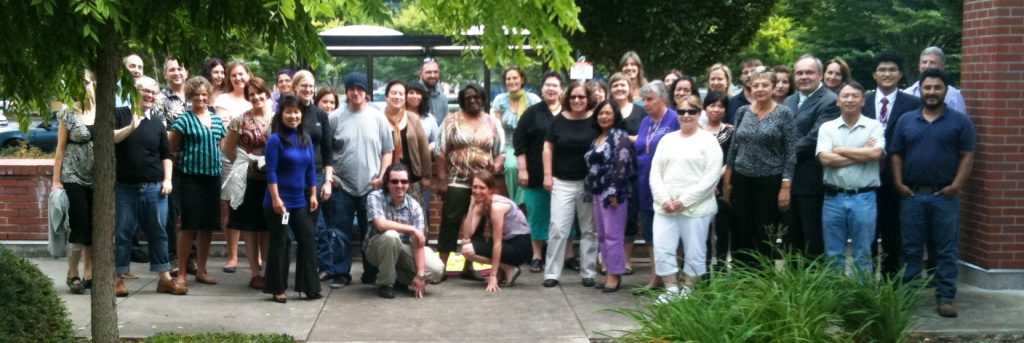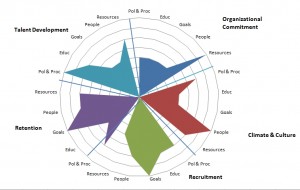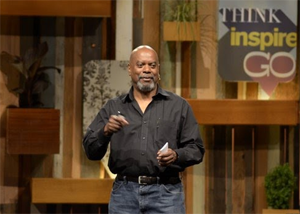IGS is experienced in developing diversity, equity, and inclusion (DEI) programs that create a respectful working community in which individuals appreciate their uniqueness, understand their differences and find common purpose in accomplishing organizational goals. IGS team members are experienced diversity trainers and practitioners who have led successful, sustained DEI development programs in government agencies.

IGS defines Diversity, Equity and Inclusion, as follows:
DiversityThe term “diversity” can be applied to any situation where there are identifiable differences between people; however, its use is primarily in the area of legally protected classifications of people. Beyond being a mandate of “affirmative action” laws, diversity in the workforce creates strength and resilience in the organization. By having multiple sources of inspiration and multiple points of view, organizations become better able to carry out their missions in an increasingly complex and multifaceted world. A diversity group or council can be a powerful resource to develop a culture that understand and respects the diversity of stakeholders, including employees, managers, policy makers, customers and the union. IGS is skilled at supporting internal diversity councils and building their effectiveness through facilitation, training, conflict resolution, planning and goal setting. |
Equity“Social equity” is the implication of fair access, full participation and self-determination within an organization. Historically, organizations in the US had both explicit and implicit barriers to full participation by all members of society. “Diversity” has helped remove some of the explicit barriers to full participation for protected classifications of people. “Equity” is the recognition and removal of implicit barriers and bias to full participation. Removing implicit barriers that hinder an organization’s effectiveness means having a workforce that is more productive, more professional, better able to communicate with itself and more focused on its organizational goals and strategies. |
Inclusion“Social inclusion” means bringing into an organization people who have been excluded from past participation. The idea of inclusion goes beyond the idea of “diversity,” which tends to focus on numbers and percentages. The goal of inclusion is “a workforce that reflects the people it serves.” By reflecting the people it serves, an organization is better able to understand, anticipate and proactively serve the people, the markets and the community in which it operates. Practicing social equity creates an increasingly resilient organization. |
Beyond Diversity, Equity, and Inclusion: Practicing ‘Inclusivity’
IGS consults with organizations and individuals regarding the concept and practice of inclusivity by helping your organization embrace inclusivity as a core concept. IGS defines ‘incusivity’, as follows:
InclusivityInclusivity is the concept that all beings are inextricably linked to each other; “We are One.” Organizations that practice inclusivity consider relationships well beyond legally protected classifications of people. Inclusive organizations identify and eliminate any and all significant barriers appearing within an organizational setting. “Inclusivity” also allows organizations to understand and dismantle the elements of invisible culture, implicit bias and unstated assumptions that exist in the workplace as barriers to the full participation of all involved. In this way, the workplace functions as a dynamic and ever-changing mosaic that can and will function for the good of all. Inclusivity enables organizations to establish and pursue creative and visionary goals that go well beyond compliance and helps them become “organizations of excellence” and leaders within their respective fields. |
Inclusivity Assessment:
We conduct assessments of how deeply your organization embodies and embraces inclusivity. The Inclusivity Assessment comes with a set of recommendations for growth and change.
-

IGS will help you assess your organization’s progress toward DEI and summarize results in an information-packed, easy-to-read graphic.
IGS summarized our extensive research on Diversity, Equity, and Inclusion Best Practices that shows the goals to which the top organizations in DEI aspire.
- IGS developed a self-evaluation matrix for Diversity, Equity and Inclusion Assessment that you can apply to your organization.
- When you partner with IGS to help you assess your organization’s progress toward DEI, we can create a “DEI Flower Chart” (see graphic, right) to summarize the assessment in a powerful visual form.
Inclusivity Awareness Sessions:
We come into your workplace and conduct awareness sessions, helping your workforce connect with each other in new and exciting ways. (This is not “diversity” training.) Each awareness session is tailor-made for your organization’s needs. Session themes include:
- Inclusivity in the Workplace
- Workplace Culture
- Workplace Dynamics
“Culture Shapers” Sessions:
After the Inclusivity Awareness sessions, we work with a small group of volunteers from your workplace to continually assess and improve workplace culture and communications. By internally “shaping” your organization’s culture, your workplace will resist the tendency to “snap back” to less effective (but familiar) cultural patterns.
DEI Resources and The Commonway Institute
 To view a recent TEDx Talk by Dr. Shariff Abdullah, click on the image to the right.
To view a recent TEDx Talk by Dr. Shariff Abdullah, click on the image to the right.
To view additional keynote addresses by Shariff, including a MLK Day keynote address for “Sisters of the Road”, a kitchen and resource center for Portland’s homeless populations, click on the following links:
MLK Day Keynote Speech, Portland, Oregon, for Sisters of the Road [HQ]
Keynote Speech for MLK Day, Portland Oregon (Part Two) [HQ]
To learn more about Sharif and the mission of Commonway Institute, visit www.commonway.org.
Want more DEI resources? Visit our “Free Stuff” page to obtain tools you can begin using today to move your organization forward on diversity, equity, and inclusion – free of charge!
